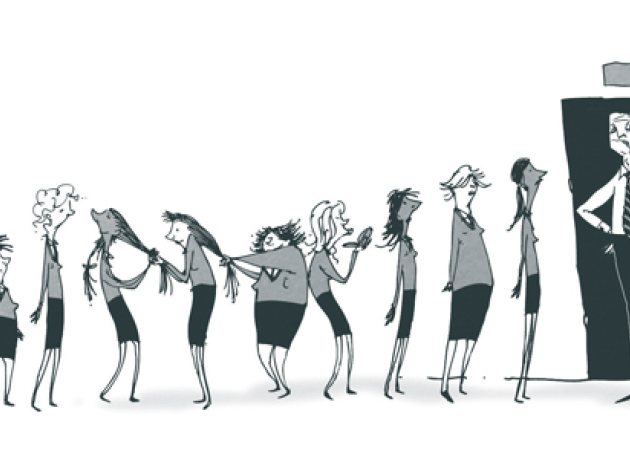What has happened to indiscipline in our schools? One hardly ever hears of a greased piglet being released into an assembly these days. Where are the great and triumphant acts of indiscipline that used to be the backbone of our educational system? Gone, gone, all gone. And with what have they been replaced? Lateness, white trainers, big earrings and the setting off of fire extinguishers: indiscipline for any school to be ashamed of.
Somewhat perversely, that I have not been entertained by the spectacle of a greased piglet running amok amongst scholars is suggestive of indiscipline in my school not being what it ought; for it is possible there to attain infamy with far less remarkable, but endlessly repeated, villainies. The spent fire extinguisher and the hackneyed white trainer are evidence of a system that in no way attempts to be foolproof, and he who bears such items wears no richer crown than that of a mundane fool. And of what use, after all, is a mundane fool? He is an embarrassment to his parents, a disappointment to his teacher, and an annoyance to his classmates.
Where is the sophisticated and intelligent japery that is the mark of an excellent fool? And where is the disciplinary rigour that nurtures him thus? According to our philosophers, nothing has changed in the rebellious nature of children for the last three thousand years at least. As much as you and I might long for it to be otherwise, there is, unfortunately, nothing unusually bad about this generation of children; they remain largely predictable creatures acting in largely predictable ways. Of course many things that affect children have changed, the most damaging of which has been the invention of adolescence – that great swathe of worklessness and deferred responsibility on which so-called developed societies so pride themselves – but the rebellious nature of the young remains constant. Why else would Mr Parkin, without my blessing, reunite himself with the crisps that I have confiscated from him and placed on my desk?
The nature of rebellion
The child, of course, loves to push the boundaries, challenge authority, and rebel. This is a good thing, since without it there would be no change. Since neither past nor present societies have been perfect, it is logical to consider that in order for improvements to be made, change must occur. It is the job of the adult and the teacher to channel the rebellion of the child into something slightly more useful than utter anarchy; to help him to be creative and purposeful in his rebellion, and not to destroy institutions that are there for his own benefit. I recently heard this lament of the apparently disenfranchised: ‘It’s so hard to be creative when you’re forced to wear school uniform.’ This schoolboy was simply confusing creativity with wanting his own way; a truly creative child would have taken a needle and thread and made alterations, or started an underground newspaper lampooning school authority.
In order for privilege not to be degraded into a supposed right, which is the first stage of scholastic rebellion – and which all too often results in mundane foolishness – the vigilant teacher regards every action as one of at least potential insurrection. We do not wish to eradicate rebelliousness, for this a medium through which children develop independence and character; no, we mean only to raise the expression of rebelliousness to something nearer an artform, and to play our part in the development of a better kind of fool. It is the job of the child to rebel, and it is the job of the adult to check and restrain this rebellion. Once this simple truth of education is understood, the job of teaching becomes far less mysterious. A climate where rebellion manifests itself in comparatively harmless breaches of the uniform code – a hat worn ominously to one side; a fat and low-slung tie; a carefully neglected button – punctuated occasionally by something quite spectacular or serious, is far more educationally conducive than one of constant and tedious clichéd breaches of discipline; for the latter is the domain of the stupidly minded, where even the mundane fool can be king for a day.
Therefore, when children perform even trifling transgressions the teacher should imply, by exhibiting the characteristics of one who is outraged and appalled, that they are misdemeanours of quite monstrous proportions. Such exaggeration is, of course, pretence, but it does redeem the scholar from more serious rule breaking: the public rebuke confirms the rebellion and the child is satisfied. The child need not move on to more serious acts, but will find future satisfaction at this level of rebellion. Thus, an unspoken code evolves whereby the teacher sets the level at which those children that need to demonstrate rebellion can do so, and the level remains constant.
Well played
I am not advocating the teacher’s following of every little incident to the same full and final conclusion; that would be exhausting, inhumane and counterproductive. What I am saying is that all acts of rebellion need to be acknowledged, and that there is acknowledgement – and therefore discipline – even in a raised eyebrow. It is important for the teacher to understand that it is highly unusual for there to be status quo or equilibrium in child rebellion – things will either be getting more serious or less serious. This being understood, the teacher ought always to be reining in the wilful youth by ever reducing the number of ways in which he is ‘allowed’ – and I use this term poetically – to demonstrate his rebellion. The teacher need not fret over the child’s liberty, or freedom of expression – children, when not stifled with too much freedom, are instinctively creative, and will encounter little difficulty in finding new schemes upon which to lavish their high-spiritedness. Therefore, the teacher who does no more than restrain the natural impulses of children improves the social and learning environment of his school and the sociability of its scholars, and plays his part in the production of a better kind of fool.
I do not suggest that every classroom can be made free of all difficult situations: into each life some rain must fall; the teacher is, after all, somebody who keeps the company of thieves and murderers some years before they are officially recognised as having fulfilled their potential. I wish only to show how the teacher, by understanding the positive role of rebellion in education, can avoid contributing to his own destruction. Often he will inherit problems of other people’s making, and then there are always the unplayable deliveries; a term used by cricket commentators to describe a ball bowled so well that if the batsman tries to play it with the bat, he will certainly nick it and be caught behind, yet if he leaves it to go harmlessly through to the wicket-keeper, it nicks the off stump. Some children are unplayable, usually through little fault of their own. There are those whom the teacher will not be able to defend his wicket against because, thankfully, they play by rules that he has never had to face: abuse, neglect, spoiling and parental separation head a sorry litany. The batsman that gets out to an unplayable delivery is never disgraced; in fact, he can expect a deal of sympathy on his walk off. The teacher must face his unplayable deliveries with decency; calmness of thought, word and deed; and in the knowledge that they do not come along often on good pitches. Then he should tuck his bat under his arm, nod approvingly, and trudge off to the pavilion.
About the expert
James Andrews is author of The Bitter Root (Haven Books, £7.99), from which this piece has been extracted along with illustrations by Darren Fletcher. he blogs as the times educational miscreant and is author (under that name) of the recently published The Art of Teaching (Summersdale, £9.99), his collection of not entirely serious aids for teachers (see pp 84-85 for a review).










